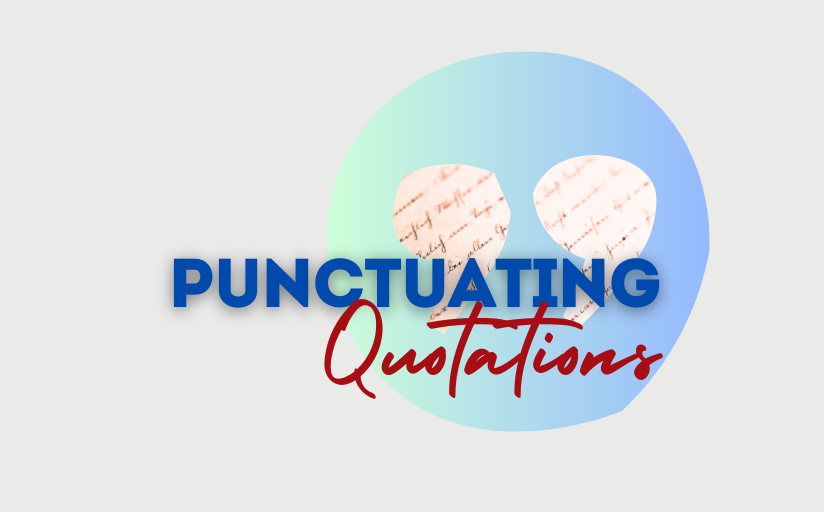Here’s the thing about punctuating quotations: The grammar rules for it are not always logical.
If you write in British English, it’s a cinch because they follow just one rule. However, in the United States, we got all persnickety and came up with a bunch of grammar rules for punctuating quotes. And the Golden Rule (placing punctuation inside quote marks) does not even ring true for a number of situations. The best way to learn this is to take it case-by-case, so let’s dive right in.
How to Punctuate Quotations
Whether you’re wondering what punctuation goes inside quotes, how to punctuate quotes themselves or anything else related to quotations and punctuation, you’ve come to the right place. We’ll start with some of the more simple quotation grammar rules and go from there.
Do Commas and Periods Go Inside the Quotes?

So, as I was saying about that Golden Rule, anytime there is a comma or period that is part of the sentence, keep it inside the quotation marks:
No: “I don’t like to run”, she said, “but I like to jump.”
No: He told me, “I really dislike going to the gym”.
Yes: “I don’t like to run,” she said, “but I like to jump.”
Yes: He told me, “I really dislike going to the gym.”
Now, if there is punctuation other than a comma or a period, it only goes inside the quotation marks if it is part of what is being quoted:
No: Didn’t Shakespeare write, “A rose by any other name would smell as sweet?”
No: I believe he wrote that in “Romeo and Juliet;” Juliet says it in the first act.
No: The woman asked me, “Did you like the play”?
Yes: Didn’t Shakespeare write, “A rose by any other name would smell as sweet”?
Yes: I believe he wrote that in “Romeo and Juliet”; Juliet says it in the first act.
Yes: The woman asked me, “Did you like the play?”
Rules for Setting Up the Quotation
There are three basic ways you introduce a quotation: with a comma, a colon or nothing at all. If you are introducing a quotation into a sentence with the words “He said” or “She asked,” then you can make the decision on your own regarding whether you want to use a comma or a colon.
Generally, longer quotations with seven words or more can take a colon and shorter ones take a comma:
No: My mother always told me, “Do unto others as you would have them do unto you.”
No: She said: “Live by that.”
Yes: My mother always told me: “Do unto others as you would have them do unto you.”
Yes: She said, “Live by that.”
How Do You Punctuate Direct Quotes?

You do not need to use any punctuation when using a direct quotation from someone that flows with the sentence and lacks an immediate introductory term.
No: She said that I was, “a good girl,”
No: There simply is, “no place like home.”
Yes: She said that I was “a good girl.”
Yes: There simply is “no place like home.”
Grammar gurus will point out that these are the quotation guidelines, though many content writers step outside them when writing. For example, if a writer wants to change the flow of the text, he or she might use a comma before a quotation when it is not necessary.
My advice? You should stick to the rules whenever possible. Quotation grammar rules are NOT meant to be broken.
The Difference Between a Quote and Quotation
Yes, there actually is a difference between the two. If you quote something, it means you are using the exact words of someone and attributing it to the source. If you use a quotation, it means you are taking a part of a book, speech or other published work to prove a point.
Technically speaking, quote is a verb and quotation is a noun. However, the two are so often interchanged that it has become acceptable to find pages online that say things like, “Funny quotes from comedians.”
Still, rules are rules, so here are some guidelines to help you know whether to use quote or quotation in your writing:
No: I love that quote from Shakespeare.
No: She used a quote from Shakespeare in her report.
Yes: I love that quotation from Shakespeare.
Yes: She quoted Shakespeare in her report.
Rules to Follow After the Quotation
In most cases, you only use a comma to close a quotation when it is not at the end of a sentence, no matter how long the quotation is:
No: “Remember to be nice to your friends at school today:” my mother reminded me.
Yes: “Remember to be nice to your friends at school today,” my mother reminded me.
Does an Exclamation Mark Go Inside the Quotes?

Of course, there is an exception to the quote grammar rule above. If the quotation would naturally end with an exclamation point or question mark, you can use it inside the quotes:
No: “Did you have a good day at school today,” she asked me.
No: “I can’t wait to ride the roller coaster” he shouted!
Yes: “Did you have a good day at school today?” she asked me.
Yes: “I can’t wait to ride the roller coaster!” he shouted.
Other Quick Tips For Using Quotations
Here are a few other things to keep in mind when you are using a quotation in your writing:
First, please remember that quotation marks come in pairs. If you start with one, you need to use the other.
No: She said, “I just love learning about grammar.
Yes: She said, “I just love learning about grammar.”
Next, let’s talk a little bit about reported speech. Reported speech refers to an indirect quotation and does not require quotation marks:
No: The secretary told me that “the phones were down.”
No: He said that “he just wanted to take a walk.”
Yes: The secretary told me that the phones were down.
Yes: He said that he just wanted to take a walk.
Referred speech is usually introduced by the word “that,” which should help you determine when and when not to use quotation marks.
Quotation Punctuation Rules: Wrapping Up
Remember that when you are writing content, you only use quotation marks when you are directly quoting something someone said. Commas and periods nearly always go inside quotes; exclamation points and question marks are a bit trickier.
Truly, this would be so much easier if we just had one way of punctuating quotations, but we do not. Do you have a quotation mark problem you would like solved? Please let us know about it in the comments below!


Leave a Reply